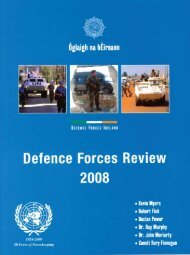09 May 2013 TERMS & CONDITIONS AND ... - Defence Forces
09 May 2013 TERMS & CONDITIONS AND ... - Defence Forces
09 May 2013 TERMS & CONDITIONS AND ... - Defence Forces
- No tags were found...
Create successful ePaper yourself
Turn your PDF publications into a flip-book with our unique Google optimized e-Paper software.
New entrants to the public service, including commissioned officers in the PDF, are<br />
insurable for full PRSI. On that basis, their occupational (or spouse's) pension is<br />
subject to integration with the State Social Insurance system in accordance with<br />
standard public service arrangements. This means that their entitlement to the range of<br />
Social Insurance benefits (including the State Pension Contributory) is taken into<br />
account when calculating the amount of occupational pension payable. This results in<br />
a lower rate of occupational pension than would otherwise be the case. Integration<br />
applies to pension and contributions, but not to gratuity.<br />
All public servants who are in pensionable employment – including members of the<br />
<strong>Defence</strong> <strong>Forces</strong> – are also liable to pay a Pension-Related Deduction (PRD)<br />
regardless of the date they join the public service. Commonly known as the ‘pension<br />
levy’, this was introduced by Government as part of a package of emergency financial<br />
measures. The PRD is separate from the standard employee pension contributions<br />
mentioned above and no additional superannuation benefits are earned as a result of<br />
the deduction.<br />
Pension abatement, pensionaccrual and declarations etc:<br />
Recent public service pension reforms provide for the extension of pension<br />
abatement. This means that a retiree’s existing public service pension is liable to<br />
abatement (i.e. reduction/suspension) on re‐entering public service<br />
employment, even where the new employment is in a different area of the public<br />
service. This abatement principle is a standard feature of public service pension<br />
schemes. It already operates within individual sectoral schemes where a public<br />
service pensioner later resumes working in his/her former occupation, whether<br />
<strong>Defence</strong> <strong>Forces</strong>, Garda, Civil Service etc. That principle now applies across and<br />
between all sectors.<br />
Normal rules regarding abatement of pension under the <strong>Defence</strong> <strong>Forces</strong><br />
superannuation arrangements will apply, as appropriate. Candidates should also<br />
be aware that if he/she was previously employed in the public service and is in<br />
receipt of a pension from the public service, the Public Service Pensions (Single<br />
Scheme and Other Provisions) Act 2012 (PSPSS), includes a provision that, with<br />
effect from 1 November 2012, will abate any Public Service pension on reemployment.<br />
From that date, candidates are also required to declare any pre‐existing<br />
entitlements to a Public Service pension benefit (whether in payment or<br />
preserved) from any other Public Service employment or any such employment<br />
in which they received a payment‐in‐lieu of pension in respect of such service.<br />
If the candidate was previously employed in the public service, please note that<br />
the PSPSS Act 2012 also includes a provision which, from 28 July 2012, limits the<br />
amount of qualifying service which can be accrued in existing (pre‐<strong>2013</strong>)<br />
pension schemes to a maximum of 40 years service across all Public Service<br />
employments. Persons exceeding the limit on that date will not lose any service<br />
accrued to that point. This may have implications for any new recruit /<br />
appointee who has already acquired pension rights in a previous Public Service<br />
employment.<br />
<strong>09</strong> <strong>May</strong> <strong>2013</strong>
















